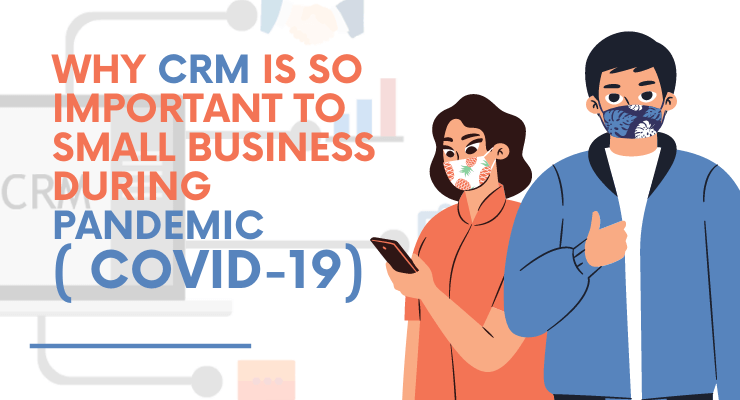Why CRM Is So Important To Small Business During Pandemic ( COVID-19)
This article, like no other, illustrates the striking differences between the attitude towards CRM system in all North America and countries abroad . There – implementation “from below”, active work of small and micro-businesses, intensive growth (and taxiing in a crisis) due to minimal automation, we have the principles of a Stone Age business: sit on the money and wait, wrap around the crisis or still burn around the company, to panic and believe that all the automation companies are at least CIA, and CRM literally transfers all the secrets of the tax to CIA. IT exists for your efficiency, for progress, for information management. It remains to understand this. In general, let’s see how they do.
The coronavirus, like no other cataclysm, plunged the world economy into crisis, forcing many businesses to connect to services or risk being closed forever. In fact, one in five businesses are now expecting a full “recovery” over the next year, with the coronavirus costing each company roughly $ 64,000.
- Small and medium-sized businesses (SMBs) have been disproportionately hit by the global pandemic: they have had to adapt to keep their customers’ attention without directly reaching those customers. As a result, many small and medium-sized businesses have been quick to implement customer relationship management (CRM) solutions, and there is no secret why.
Those who have taken advantage of CRM, cutting edge solutions to increase loyalty, engagement and customer retention, live much better than those who have not. According to Bain & Company, a 5% increase in customer retention can give companies 75% of the profit growth.
As we all know, keeping in touch with customers is a lifeline for any company, regardless of industry. The use of CRM is useful for business, since there is still a big difference between those who succeed and those who are actively struggling to survive.
CRM give small and medium businesses a head start
Long before the pandemic turned the world upside down, customers were demanding a more thoughtful approach and personalized experience. For the rugged enterprise class, there was an endless choice of CRM configurations, but nothing to match the needs and budgets of SMBs. As the world moves into virtual reality, it is time for small businesses to invest in these innovative software solutions, CRM systems.
The CRM technology has long been considered the most important tool for any business. But with the new operational challenges of health and safety constraints, it has become important to stay afloat. CRM not only provides first-class customer service, but it also increases revenue and gives small and medium-sized businesses a competitive edge.
Simplified customer management
One of the main reasons that more and more SMEs are investing in CRM solutions is the incredible ability of CRM systems to simplify customer management by centralizing customer data. So, a recent report showed that 74% of users of CRM systems said that their system made it easier to access customer data, made it qualitatively better.
The CRMs simplify storing customer data in a single information base, making information available to all departments and providing a 360 ‘view of customers in real time. This reduces the time wasted searching for accurate customer information. Service teams quickly gain access to the data they need to support their customers while driving value, engagement, and sales. With simplified processes for small customer service tasks, CRM can dramatically improve productivity and reach more leads.
Flawless sales strategy
The CRM applications can help increase sales by 29%, sales productivity by 34% and sales forecast accuracy by 42%. With CRM, which helps you easily identify where customers are in the funnel, marketers can prioritize customer interactions. Inactive customers are drawn into the sales cycle at the right moment for the customer and the company.
Each stage of the customer lifecycle can be tracked and acted upon, while ensuring strategic alignment across the entire business. Accurate forecasting of the company’s development becomes possible thanks to reporting tools in CRM and access to client history.
Automatic targeted marketing
Today’s consumers don’t just expect personalized and relevant content, they demand it. A one-size-fits-all approach to customers is an archaic story, but marketing personalization can take an extremely long time, especially when customer data is disorganized and fragmented. CRM makes customer data more digestible and segmented, which makes it easier to work with key audiences.
The CRM system also collects data about customer behavior and preferences, which allows marketers to take informed action to dramatically improve the customer experience. Avoiding mass marketing and creating a two-way dialogue between marketers and buyers sets any business apart from its competitors.
In addition, CRM analyzes past marketing campaigns to determine which key trends have yielded the desired results, allowing marketers to make more informed campaign decisions and hypothesize when planning new, high-quality campaigns.
Increase in profits
The CRM is critical to any business looking to maximize profitability from a customer database. Installing a successful CRM can save valuable hours of working time for small and medium-sized businesses, in turn, save money through more productive activities. As sales and productivity grow, companies can have higher customer retention rates, while lowering the rate of customer retention and profit margins. In fact, according to the Harvard Business Review, a 5% reduction in customer bounce rates can increase profits by up to 95%.
Use CRM to its fullest
The CRM software can cool many aspects of a small business, but only if you use all the software’s features to the fullest. On average, companies use only 20% of their CRM capabilities.
If a business is just starting to use CRM software or does not have the resources for advanced work with the system, freelancers can be helpful.
Highly skilled and certified freelancers can offer a personalized approach to CRM and provide the exact solutions a business needs, without long term contracts, limits or minimums. Using freelancers who know the platform inside out can increase the opportunities for business success and growth. Freelancers are trained to seamlessly integrate CRM into an existing organization and quickly identify and solve even the biggest business challenges.
Conclusion
The unique nature of the pandemic is already posing new challenges for businesses of all sizes as they recover. Fortunately, CRM technology gives companies the edge by helping them target the highest quality leads, increase retention efforts, increase sales productivity, and be as personalized as possible. Investing in the right technology will create additional growth for any business, even in this period of economic uncertainty.





